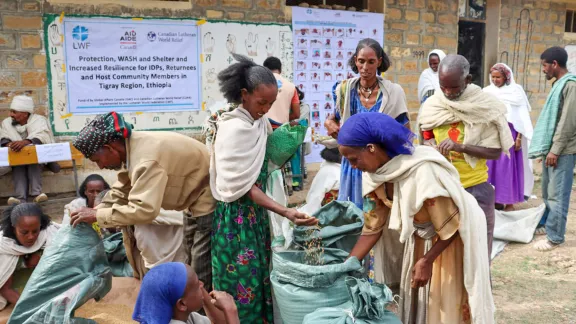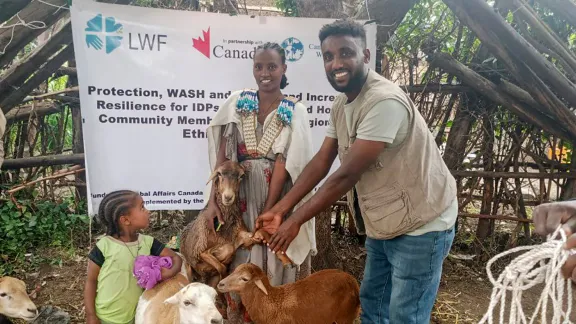The LWF country Representative in Ethiopia welcomes the resumption of food aid, as internal conflicts in Amhara and Oromia regions cause human casualties, lead to food shortages, and internal displacement.

Distribution of grain to displaced people in Maichew, Southern Tigray. Because of the conflict, farmers have not been able to plant and harvest. Photo: LWF
LWF country representative warns of multi crises in Ethiopia
(LWI) - The resumption of food aid in Ethiopia is very welcome, says Sophia Gebreyes, LWF Country Representative in Ethiopia. “USAID started with food aid to refugees last month, and will begin distributions for internally displaced persons (IDP) soon. We welcome this development, as millions of IDP went without food assistance for half a year.”
USAID and the United Nations agency WFP had suspended their assistance following allegations of large-scale food theft, since March 2023 in Tigray and since June for the entire country. In Tigray, according to local administration, the suspension was the cause for more than 1,000 hunger-related deaths.
Away from the spotlight
The humanitarian crisis in Ethiopia needs more international attention, says Gebreyes. Multiple internal conflicts in Amhara and Oromia regions cause human casualties lead to food shortages and internal displacement. At the same time, humanitarian access is restricted. This includes an LWF food security and resilience project in Lalibela, North Wello, which cannot be implemented as usual. For the refugees from Sudan in the Kumer refugee camp in Western Ethiopia, assistance has become unpredictable. The response is frequently interrupted, Gebreyes explains.
In Ethiopia, away from the spotlight, the situation in the north is going from serious to critical.
Sophia Gebreyes, LWF Country Representative in Ethiopia
"The situation in the north of Ethiopia is going from serious to critical”, said Gebreyes. While the Tigray conflict ended with a cessation of hostilities agreement two years ago, she says, “it takes time to re-establish administrative structures to pave the way to genuine reconstruction.” Tensions remain in the border area between Amhara and Tigray.

Farmers receive livestock at a distribution by LWF and partners in Maichew. Millions in the country are food insecure. Photo: LWF
The situation is particularly difficult for the 1.8 million internally displaced people in Tigray, who still have not been able to return home and continue to live in public schools in the region. “This means that schools cannot be used for their original purpose, condemning many children in Tigray to yet another year without formal education.” Gebreyes says.
“We cannot provide the people we serve with what they need, in a timely manner” Gebreyes says. “Everything is delayed. The active combat in the North causes severe food insecurity as people cannot grow food. Their situation is extremely dire.”


